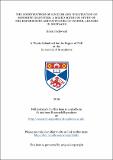Files in this item
The construction of success and negotiation of minority identities : a mixed methods study of the experiences and outcomes of school leavers in Scotland
Item metadata
| dc.contributor.advisor | Finney, Nissa | |
| dc.contributor.advisor | McCollum, David | |
| dc.contributor.author | Packwood, Helen | |
| dc.coverage.spatial | xv, 314 p. | en_US |
| dc.date.accessioned | 2019-06-27T08:05:41Z | |
| dc.date.available | 2019-06-27T08:05:41Z | |
| dc.date.issued | 2019-06-26 | |
| dc.identifier.uri | https://hdl.handle.net/10023/17985 | |
| dc.description.abstract | Each year in Scotland, around 50,000 young people complete their secondary education and leave school. This period of educational transition is laden with risks and opportunities; significant decisions are made and life chances established. This thesis explores the divergent educational experiences and outcomes of school leavers in Scotland using mixed methods and is situated within debates about structural inequalities in the UK. Inequalities in educational achievement appear to be associated with three key drivers, socio-economic status, ethnicity and gender. Most recent research has looked at these factors separately. This study examines ethnic and migrant background alongside other axes of difference in order to gain a more accurate picture of the educational transitions of school leavers in Scotland. The findings draw on repeat interviews with school leavers (n=34) in two contrasting secondary schools over a period of two years. In addition, a novel linkage of two administrative datasets gives a large sample allowing the analysis of national trends in the educational outcomes of school leavers between 2006-2016 (n=471,317) with detailed ethnic and social stratification. Together, these data provide a powerful analytical tool to interrogate post-school destinations in Scotland. The analysis of quantitative and qualitative data reveal new insights on the significant differences in post-school destinations and aspirations depending on ethnic and socio-economic background. For example, White Polish and White Other pupils are less likely to go to University than any other minority ethnic group, even once socio-economic differences are taken into account. Yet the qualitative fieldwork reveals high aspirations and attainment within these groups. This research raises questions about the persistence of educational inequalities and illustrates how this is underpinned by the ways in which educational success is constructed and measured within neoliberal educational environments and how minority identities are negotiated in the transition to adulthood. | en_US |
| dc.language.iso | en | en_US |
| dc.publisher | University of St Andrews | en |
| dc.subject.lcc | LA656.P2 | |
| dc.subject.lcsh | High school graduates--Scotland | en |
| dc.subject.lcsh | Children of minorities--Scotland | en |
| dc.subject.lcsh | Ethnicity--Scotland | en |
| dc.title | The construction of success and negotiation of minority identities : a mixed methods study of the experiences and outcomes of school leavers in Scotland | en_US |
| dc.type | Thesis | en_US |
| dc.contributor.sponsor | University of St Andrews. School of Geography and Sustainable Development | en_US |
| dc.type.qualificationlevel | Doctoral | en_US |
| dc.type.qualificationname | PhD Doctor of Philosophy | en_US |
| dc.publisher.institution | The University of St Andrews | en_US |
| dc.identifier.doi | https://doi.org/10.17630/10023-17985 |
This item appears in the following Collection(s)
Items in the St Andrews Research Repository are protected by copyright, with all rights reserved, unless otherwise indicated.

